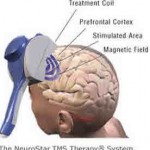 TMS is a revolutionary treatment for major depression that is being significantly underutilized, but it is also a very expensive treatment that does not work for many patients with treatment resistant depression.
TMS is a revolutionary treatment for major depression that is being significantly underutilized, but it is also a very expensive treatment that does not work for many patients with treatment resistant depression.
One of the major issues impeding the use of TMS is the difficulty identifying patients who are likely to respond to treatment.
In an earlier blog post we pointed out that elevated C Reactive Protein may predict non-response to an SSRI.
This month, in Biological Psychiatry, there was an article that strongly suggested that severe anhedonia was a major predictor of non-response to TMS.
As in previous studies of TMS in patients with chronic and treatment refractory depression, Jonathan Downar and colleagues from the University of Toronto, reported that only about half of these patients responded to 6 weeks of rapid TMS (note that this is a much larger response than the STAR-D studies suggest would take place with another medication trial).
In this study, treatment response was strongly bimodal, with individual patients showing either minimal or marked improvement. Compared with responders, nonresponders showed markedly higher baseline anhedonia symptomatology (including pessimism, loss of pleasure, and loss of interest in previously enjoyed activities) on item-by-item examination of Beck Depression Inventory-II and Quick Inventory of Depressive Symptomatology ratings. Congruently, on baseline functional magnetic resonance imaging, nonresponders showed significantly lower connectivity through a classical reward pathway comprising ventral tegmental area, striatum, and a region in ventromedial prefrontal cortex. Responders and nonresponders also showed opposite patterns of hemispheric lateralization in the connectivity of dorsomedial and dorsolateral regions to this same ventromedial region.
Two items on the Beck Depression Inventory II predicted non-response to TMS –
Pessimism
- I am not discouraged about my future
- I feel more discouraged about my future than I used to be
- I do not expect things to work out for me
- I feel my future is hopeless and will only get worse
Loss of Pleasure
- I get as much pleasure as I ever did from the things I enjoy
- I don’t enjoy things as much as I used to
- I get very little pleasure from the things I used to enjoy
- I can’t get any pleasure from the things I used to enjoy
Interestingly, the seemingly more related question about interest in sex did not…
The correlation of this finding with functional brain imaging data showing lowered connectivity between reward areas of the prefrontal cortex and reward areas in the limbic brain supports the importance of this finding.
For more on this study you can see the abstract here –
Biol Psychiatry. 2014 Aug 1;76(3):176-85. doi: 10.1016/j.biopsych.2013.10.026. Epub 2013 Nov 28.
Anhedonia and reward-circuit connectivity distinguish nonresponders from responders to dorsomedial prefrontal repetitive transcranial magnetic stimulation in major depression. Downar J, Geraci J, Salomons TV, Dunlop K4 Wheeler S, McAndrews MP, Bakker N, Blumberger DM, Daskalakis ZJ, Kennedy SH, Flint AJ, Giacobbe P.
